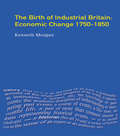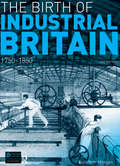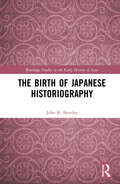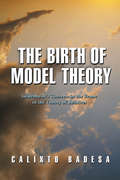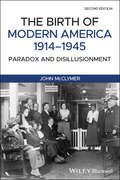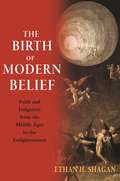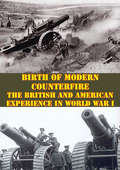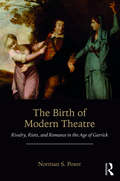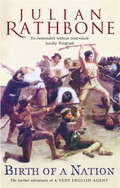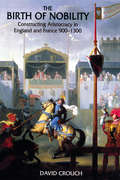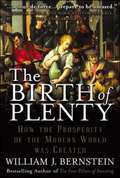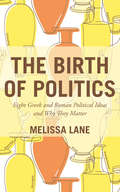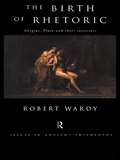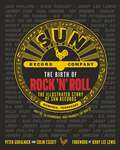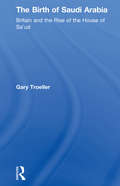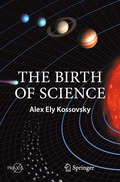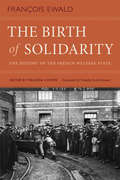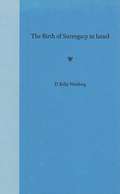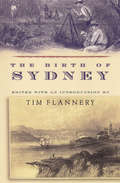- Table View
- List View
The Birth of Industrial Britain: Social Change, 1750-1850 (Seminar Studies in History)
by Kenneth MorganThe companion volume to The Birth of Industrial Britain: Economic Change, together they provide a comprehensive guide to Britain's development as the first industrial power. This volume focuses on the social impact of early industrializaton on the population and looks at living standards, work and leisure, crime and the law, religion, education, the Poor Law and popular protest.
The Birth of Industrial Britain: Economic Change, 1750-1850
by Kenneth MorganAn introductory text on economic development during Britain's Industrial Revolution. It considers the significance and scale of changes and provides a concise overview of the state of current research on this key period.
The Birth of Industrial Britain: 1750-1850 (Seminar Studies)
by Kenneth MorganThe Industrial Revolution had a profound and lasting effect on socioeconomic and cultural conditions in Britain.The Birth of Industrial Britain examines the impact of early industrialisation on British society in the century before 1850, coinciding with Britain's transition from a late pre-industrial economy to one based on industrialisation and urbanisation.This fully revised and updated second edition provides a comprehensive range of pedagogical material to support the text, including a Glossary of terms, people and parliamentary acts, new primary source documents and a brand new Chronology and 'Who's Who' section. The Birth of Industrial Britain provides an essential up-to-date synthesis of the impact of the Industrial Revolution on British society for students at all levels.
The Birth of Israel: Myths and Realities
by Simha FlapanIn this ground-breaking and controversial history of the founding of Israel, noted Israeli scholar and peace activist Simha Flapan gives us the first true account of one of the most momentous political events of the century. Drawing on recently declassified material--from Ben-Gurion's war diaries to the minutes of secret meetings--Flapan reconstructs the real events of that critical time. Behind the received historical truths--that the Zionists welcomed the partition of Palestine into an Arab and a Jewish state; that the Palestinians fled Israel despite the efforts of Jewish leaders to get them to stay; that when after a miraculous victory in 1948 Israel extended its hand in peace not a single Arab leader responded--Flapan finds instead propaganda myths that have misguided Israeli policy to this day. Eye-opening and bold, full of unsettling revelations, The Birth of Israel offers fresh hope for understanding today's tragic Arab-Israeli stalemate, and for moving toward a solution.
The Birth of Japanese Historiography (Routledge Studies in the Early History of Asia)
by John R. BentleyAs the first book in English on the origins of Japanese historiography, using both archaeological and textual data, this book examines the connection between ancient Japan and the Korean kingdom of Paekche and how tutors from the kingdom of Paekche helped to lay the foundation for a literate culture in Japan. Illustrating how tutors from the kingdom of Paekche taught Chinese writing to the Japanese court through the prism of this highly civilized culture, the book goes on to argue that Paekche tutors guided the early Japanese court through writing, recording family history, and ultimately an early history of the ruling family. As the Japanese began to create their own history, they relied on Paekche histories as a model. Triangulating textual data from Kojiki, Nihon shoki, and Sendai kuji hongi, the author here demonstrates that various aspects of early king genealogies and later events were manipulated. Offering new theories about the Japanese ruling family, it is posited that Emperor Jitō had her committee put Jingū in power, and Suiko on the throne in place of original male rulers to enhance images of strong, female rulers, as she envisioned herself. The Birth of Japanese Historiography will be a valuable resource for students and scholars of Japanese history, historiography, and linguistics.
The Birth of Model Theory: Löwenheim's Theorem in the Frame of the Theory of Relatives
by Calixto BadesaLöwenheim's theorem reflects a critical point in the history of mathematical logic, for it marks the birth of model theory--that is, the part of logic that concerns the relationship between formal theories and their models. However, while the original proofs of other, comparably significant theorems are well understood, this is not the case with Löwenheim's theorem. For example, the very result that scholars attribute to Löwenheim today is not the one that Skolem--a logician raised in the algebraic tradition, like Löwenheim--appears to have attributed to him. In The Birth of Model Theory, Calixto Badesa provides both the first sustained, book-length analysis of Löwenheim's proof and a detailed description of the theoretical framework--and, in particular, of the algebraic tradition--that made the theorem possible. Badesa's three main conclusions amount to a completely new interpretation of the proof, one that sharply contradicts the core of modern scholarship on the topic. First, Löwenheim did not use an infinitary language to prove his theorem; second, the functional interpretation of Löwenheim's normal form is anachronistic, and inappropriate for reconstructing the proof; and third, Löwenheim did not aim to prove the theorem's weakest version but the stronger version Skolem attributed to him. This book will be of considerable interest to historians of logic, logicians, philosophers of logic, and philosophers of mathematics.
The Birth of Modern America, 1914 - 1945: Paradox and Disillusionment
by John McClymerProvides a look at the origins of the culture wars of modern America and the political and economic transformation of the U.S. republic This book tells, in clear and lively prose, how Americans struggled with modernity in both its cultural and economic forms between the start of World War I and the end of World War II, focusing on the 1920s through 1930s. This edition includes revisions that expand the scope and features increased coverage of topics that will be of great interest to new readers as well as those familiar with the subject. The Birth of Modern America, 1914-1945, Second Edition begins with a discussion of the promises and perils of the progressive era. The book goes on to look at the Great War and life on the home front and explores many paradoxes that marked the birth of Modern America. Topics covered include: the pervasive racism and nativism during and after WWI; the disillusionment with Woodrow Wilson's rhetorical idealism; the emergence of national media; the Great Depression; FDR and the New Deal; the attack on Pearl Harbor; Hollywood’s part during World War II; the United States' decision to drop "the bomb" on Japan; and more. Makes a strong contribution to understanding American society in the interwar years (1920s and 1930s) Disputes that American entry into WWII brought the New Deal to an end and argues that wartime measures foreshadowed postwar American practice Features more coverage of politics in the 1920s and 1930s Includes an Afterword covering the G.I. bill, postwar prosperity, Americans' move to the suburbs, the challenges to peace in Europe and Asia, and the Cold War The Birth of Modern America, 1914-1945 is an excellent book for undergraduate courses on the 20th Century and advanced placement courses. It will benefit all students and scholars of the Progressive Era, the Depression, 1920s and 1930s America, and America between the Wars.
The Birth of Modern Belief: Faith and Judgment from the Middle Ages to the Enlightenment
by Ethan H. ShaganAn illuminating history of how religious belief lost its uncontested status in the WestThis landmark book traces the history of belief in the Christian West from the Middle Ages to the Enlightenment, revealing for the first time how a distinctively modern category of belief came into being. Ethan Shagan focuses not on what people believed, which is the normal concern of Reformation history, but on the more fundamental question of what people took belief to be.Shagan shows how religious belief enjoyed a special prestige in medieval Europe, one that set it apart from judgment, opinion, and the evidence of the senses. But with the outbreak of the Protestant Reformation, the question of just what kind of knowledge religious belief was—and how it related to more mundane ways of knowing—was forced into the open. As the warring churches fought over the answer, each claimed belief as their exclusive possession, insisting that their rivals were unbelievers. Shagan challenges the common notion that modern belief was a gift of the Reformation, showing how it was as much a reaction against Luther and Calvin as it was against the Council of Trent. He describes how dissidents on both sides came to regard religious belief as something that needed to be justified by individual judgment, evidence, and argument.Brilliantly illuminating, The Birth of Modern Belief demonstrates how belief came to occupy such an ambivalent place in the modern world, becoming the essential category by which we express our judgments about science, society, and the sacred, but at the expense of the unique status religion once enjoyed.
Birth Of Modern Counterfire - The British And American Experience In World War I
by Major William M. CampseyThis study investigates the original needs for and development of counterfire techniques in World War I. Concentrating on the experiences of the British and the Americans, the examination explores techniques of counterfire and their failures or successes.The first chapter investigates why World War I was the first war in which modern counterfire techniques were employed. Chapter 2 describes the British experience. Chapters 3 & 4 explain how the Americans trained for and fought in the war. The last chapter analyses those techniques and principles of action that had relevance for both nations.The study concludes that several techniques were necessary in World War I to suppress enemy artillery. First, efforts to destroy enemy artillery before battles were not as successful as efforts to neutralize it for the duration of the battle. Second, with the enormity of details necessary to collect intelligence, assign targets, preposition ammunition, and execute the program of fire, competent staff work became critical. Third, the intelligence procedures developed in position warfare were insufficient to suppress enemy artillery as the battle line moved progressively forward. Suppression of all terrain in the zone of operations that was capable of holding enemy artillery became necessary. Finally, artillery organization and control must be centralized.The study also identifies two techniques necessary to exploit successful counterfire. First, surprise over the enemy would invariably gain the initiative. The enemy guns would not recover from the surprise for the duration of time that neutralization fires continued. Second, counterfire must be integrated into the overall fireplan and the infantry scheme of maneuver. It did the commander no good if counterfire was successful only to fail to exploit that success with maneuver.
The Birth Of Modern Riverine Warfare: US Riverine Operations In The Vietnam War
by Lieutenant Commander William B. BassettThis paper examines U.S. riverine operations in the Vietnam War. With the current drive to establish a riverine capability within the U.S. Armed Forces as an integral part of the GWOT and small wars of the future, the evolution and operation of the U.S. riverine force during the Vietnam War serves as an effective blueprint for the conduct of modern riverine warfare.American riverine forces in Vietnam operated in a diverse range of brown and green water environments, successfully conducting a wide variety of missions. The evolution of these forces reflected the continuing need to develop the capabilities necessary for these operations. Their success was largely derived from experience which resulted in the creation of a variety of discrete riverine task forces specially configured for their specific missions as the situation dictated. U.S. riverine operations in Vietnam illustrate the complex nature of operations in brown and green water and the inherently joint requirement of the forces involved. The lessons learned as a result of these operations should be incorporated as a fundamental part of the creation of any modern riverine force.
The Birth of Modern Science
by Paolo RossiOne of a series on the historic development of Europe, covers the development of science.
The Birth of Modern Theatre: Rivalry, Riots, and Romance in the Age of Garrick
by Norman S. PoserThe Birth of Modern Theatre: Rivalry, Riots, and Romance in the Age of Garrick is a vivid description of the eighteenth-century London theatre scene—a time when the theatre took on many of the features of our modern stage. A natural and psychologically based acting style replaced the declamatory style of an earlier age. The theatres were mainly supported by paying audiences, no longer by royal or noble patrons. The press determined the success or failure of a play or a performance. Actors were no longer shunned by polite society, some becoming celebrities in the modern sense. The dominant figure for thirty years was David Garrick, actor, theatre manager and playwright, who, off the stage, charmed London with his energy, playfulness, and social graces. No less important in defining eighteenth-century theatre were its audiences, who considered themselves full-scale participants in theatrical performances; if they did not care for a play, an actor, or ticket prices, they would loudly make their wishes known, sometimes starting a riot. This book recounts the lives—and occasionally the scandals—of the actors and theatre managers and weaves them into the larger story of the theatre in this exuberant age, setting the London stage and its leading personalities against the background of the important social, cultural, and economic changes that shaped eighteenth-century Britain. The Birth of Modern Theatre brings all of this together to describe a moment in history that sowed the seeds of today’s stage.
Birth Of A Nation: A Novel Epub
by Julian RathboneEddie Bosham (aka Charlie Boylan) is in prison on a murder charge. But he's not worried. He's innocent, and, anyway, he has hidden proof of a ghastly scandal that could bring down the monarchy.Taking up his memoirs from where we left him, marooned on the Galapágos Islands, we find Eddie offering a young Charles Darwin an explanation of why the finches on the islands vary. In Texas, staunchly loyal to whichever side will win, he spies for General Santa Anna at the Alamo and, with the help of Emily Morgan, the ravishingly beautiful Yellow Rose of Texas, for Sam Houston at San Jacinto. Eddie works the Mississippi riverboats as a cardsharp. Caught cheating, he is forced to jump ship and inadvertently stumbles across the secret that will launch the Californian Gold Rush. Finally, having traversed the girth of a nation, his disgraceful saga ends, back east, at a highly inflammatory revivalist meeting.
Birth Of A Nation: A Novel
by Julian RathboneEddie Bosham (aka Charlie Boylan) is in prison on a murder charge. But he's not worried. He's innocent, and, anyway, he has hidden proof of a ghastly scandal that could bring down the monarchy.Taking up his memoirs from where we left him, marooned on the Galapágos Islands, we find Eddie offering a young Charles Darwin an explanation of why the finches on the islands vary. In Texas, staunchly loyal to whichever side will win, he spies for General Santa Anna at the Alamo and, with the help of Emily Morgan, the ravishingly beautiful Yellow Rose of Texas, for Sam Houston at San Jacinto. Eddie works the Mississippi riverboats as a cardsharp. Caught cheating, he is forced to jump ship and inadvertently stumbles across the secret that will launch the Californian Gold Rush. Finally, having traversed the girth of a nation, his disgraceful saga ends, back east, at a highly inflammatory revivalist meeting.
The Birth of Nobility: Constructing Aristocracy in England and France, 900-1300
by David CrouchFor 300 years separate and mutually uncomprehending English and French historiographies have confused the history of medieval aristocracy. Unpicking the basic assumptions behind both national traditions, this book explains them, reconciles them and offers entirely new ways to take the study of aristocracy forward in both England and France. The Birth of Nobility analyses the enormous international field of publications on the subject of medieval aristocracy, breaking it down into four key debates: noble conduct, noble lineage, noble class and noble power. Each issue is subjected to a thorough review by comparing current scholarship with what a vast range of historical source material actually says. It identifies the points of divergence in the national traditions of each of these debates and highlights where they have been mutually incomprehensible. For students studying medieval Europe.
The Birth of Plenty: How the Prosperity of the Modern World Was Created
by William J. BernsteinA compact and immensely readable economic, political, military, and institutional history of our civilization that is a tour de force.
The Birth of Politics: Eight Greek and Roman Political Ideas and Why They Matter
by Melissa LaneIn The Birth of Politics, Melissa Lane introduces the reader to the foundations of Western political thought, from the Greeks, who invented democracy, to the Romans, who created a republic and then transformed it into an empire. Tracing the origins of our political concepts from Socrates to Plutarch to Cicero, Lane reminds us that the birth of politics was a story as much of individuals as ideas. Scouring the speeches of lawyers alongside the speculations of philosophers, and the reflections of ex-slaves next to the popular comedies and tragedies of the Greek and Roman stages, this book brings ancient ideas to life in unexpected ways. Lane shows how the Greeks and Romans defined politics with distinctive concepts, vocabulary, and practices—all of which continue to influence politics and political aspirations around the world today. She focuses on eight political ideas from the Greco-Roman world that are especially influential today: justice, virtue, constitution, democracy, citizenship, cosmopolitanism, republic, and sovereignty. Lane also describes how the ancient formulations of these ideas often challenge widely held modern assumptions—for example, that it is possible to have political equality despite great economic inequality, or that political regimes can be indifferent to the moral character of their citizens. A stimulating introduction to the origins of our political ideas and ideals, The Birth of Politics demonstrates how much we still have to learn from the political genius of the Greeks and Romans.
The Birth of Politics: Eight Greek and Roman Political Ideas and Why They Matter
by Melissa LaneIn The Birth of Politics, Melissa Lane introduces the reader to the foundations of Western political thought, from the Greeks, who invented democracy, to the Romans, who created a republic and then transformed it into an empire. Tracing the origins of our political concepts from Socrates to Plutarch to Cicero, Lane reminds us that the birth of politics was a story as much of individuals as ideas. Scouring the speeches of lawyers alongside the speculations of philosophers, and the reflections of ex-slaves next to the popular comedies and tragedies of the Greek and Roman stages, this book brings ancient ideas to life in unexpected ways. Lane shows how the Greeks and Romans defined politics with distinctive concepts, vocabulary, and practices--all of which continue to influence politics and political aspirations around the world today. She focuses on eight political ideas from the Greco-Roman world that are especially influential today: justice, virtue, constitution, democracy, citizenship, cosmopolitanism, republic, and sovereignty. Lane also describes how the ancient formulations of these ideas often challenge widely held modern assumptions--for example, that it is possible to have political equality despite great economic inequality, or that political regimes can be indifferent to the moral character of their citizens. A stimulating introduction to the origins of our political ideas and ideals, The Birth of Politics demonstrates how much we still have to learn from the political genius of the Greeks and Romans.
The Birth of Rhetoric: Gorgias, Plato and their Successors (Issues in Ancient Philosophy)
by Robert WardyWhat is rhetoric?Is it the capacity to persuade? Or is it 'mere' rhetoric: the ability to get others to do what the speaker wants, regardless of what they want? This is the rhetoric of ideological manipulation and political seduction. Rhetoric is for some a distinctive mode of communication; for others, whenever someone speaks, rhetoric is present.This book is devoted to helping readers understand these rival accounts, by showing how it has happened that there are so many conceptions of rhetoric. Any such approach must be rooted in classical antiquity, since our ideas of rhetoric are the product of a complicated historical process starting in ancient Greece. Greek rhetoric was born in bitter controversy. The figure of Gorgias is at the centre of that debate and of this book: he invites us to confront the terrifying, exhilarating possibility that persuasion is just power.
The Birth of Rock 'n' Roll: The Illustrated Story of Sun Records and the 70 Recordings That Changed the World
by Peter Guralnick Colin EscottIn Memphis, Tennessee, in the 1950s, there was hard-edged blues playing on Beale Street, and hillbilly boogie on the outskirts of town. But at Sam Phillips&’ Sun Records studio on Union Avenue, there was something different going on – a whole lotta shakin&’, rockin&’, and rollin&’. This is where rock &’n&’ roll was born. Sun Records: the company that launched Elvis Presley, Jerry Lee Lewis, Johnny Cash, Roy Orbison, and Carl Perkins. The label that brought the world, &“Blue Suede Shoes,&” &“Whole Lotta Shakin&’ Goin&’ On,&” &“Breathless,&” &“I Walk the Line,&” &“Mystery Train,&” &“Good Rockin&’ Tonight.&” The Birth of Rock &’n&’ Roll: 70 Years of Sun Records is the official history of this legendary label, and looks at its story in a unique way: through the lens of 70 of its most iconic recordings. From the early days with primal blues artists like Howlin&’ Wolf and B.B. King to long nights in the studio with Elvis and Jerry Lee Lewis, you will see how the label was shaped and how it redefined American music. Accompanying the recordings is the label&’s origin story and a look at the mission of the label today, as well as &“Sun Spot&” sidebars—a fascinating dive into subjects such as how the iconic logo was created, the legendary Million Dollar Quartet sessions, and how the song &“Harper Valley, PTA&” funded the purchase of the label. Written by two of the most acclaimed music writers of our time, Peter Guralnick and Colin Escott, and featuring hundreds of rare images from the Sun archives as well as a foreword by music legend Jerry Lee Lewis, this is a one-of-a-kind book for anyone who wants to know where it all started.
The Birth of Saudi Arabia: Britain and the Rise of the House of Sa'ud
by Gary TroellerFirst Published in 1976. Today the name Sa'udi Arabia evokes images of desert wastes, limitless reservoirs of oil and economic might. When one thinks of the predominant foreign power concerned with the desert kingdom, one thinks of the United States. Forty yean; ago, oil had yet to be discovered, ibn Sa 'ud had just unified the greater part of the Arabian Peninsula and Great Britain exercised paramount influence at the Sa'udi Court. This book deals with the drama of the immediate pre-oil era and sets the stage for the Sa'udi Arabia of today. The following pages examine in detail the unification of Arabia and British policy towards ibn Sa'ud during the early twentieth century when he laid the foundations of present-day Sa'udi Arabia.
The Birth of Science (Springer Praxis Books)
by Alex Ely KossovskyThis book reveals the multi-generational process involved in humanity's first major scientific achievement, namely the discovery of modern physics, and examines the personal lives of six of the intellectual giants involved. It explores the profound revolution in the way of thinking, and in particular the successful refutation of the school of thought inherited from the Greeks, which focused on the perfection and immutability of the celestial world. In addition, the emergence of the scientific method and the adoption of mathematics as the central tool in scientific endeavors are discussed. The book then explores the delicate thread between pure philosophy, grand unifying theories, and verifiable real-life scientific facts. Lastly, it turns to Kepler’s crucial 3rd law and shows how it was derived from a mere six data points, corresponding to the six planets known at the time. Written in a straightforward and accessible style, the book will inform and fascinate all aficionados of science, history, philosophy, and, in particular, astronomy.
The Birth of Solidarity: The History of the French Welfare State
by François EwaldFrançois Ewald's landmark The Birth of Solidarity—first published in French in 1986, revised in 1996, with the revised edition appearing here in English for the first time—is one of the most important historical and philosophical studies of the rise of the welfare state. Theorizing the origins of social insurance, Ewald shows how the growing problem of industrial accidents in France throughout the nineteenth century tested the limits of classical liberalism and its notions of individual responsibility. As workers and capitalists confronted each other over the problem of workplace accidents, they transformed the older practice of commercial insurance into an instrument of state intervention, thereby creating an entirely new conception of law, the state, and social solidarity. What emerged was a new system of social insurance guaranteed by the state. The Birth of Solidarity is a classic work of social and political theory that will appeal to all those interested in labor power, the making and dismantling of the welfare state, and Foucauldian notions of governmentality, security, risk, and the limits of liberalism.
The Birth of Surrogacy in Israel
by D. Kelly WeisbergThis is the first book that explores the controversial dilemmas posed by surrogate motherhood--the practices that help infertile couples to have a biologically related child--and connects them to events that led to passage of a revolutionary surrogacy law in Israel. As D. Kelly Weisberg discusses the country's surrogacy legislation, passed in 1996, she reveals a unique regulatory scheme that blazes a trail for those who wrestle with the complex legal, medical, and ethical aspects of new reproductive technologies. At the same time, she illuminates the roles of key players in the enactment of that program--barren wives challenged the government, childless couples who participated in a lawsuit against the Israeli Parliament, the family law practitioner who championed the cause before the Israeli Supreme Court, the academics who served on the law reform commission, and the feminist legal scholar who drafted that commission's controversial recommendations. Surrogacy has led to the birth of more than 10,000 babies worldwide. Yet the practice challenges our notions of motherhood, fatherhood, family, and procreation. With surrogacy, the family has become a creation of the marketplace: children come into being as the product of contractual arrangements between perfect strangers. And serious disputes sometimes arise as a result. Conservative religious and political influences at play in Israel make it an unlikely setting for progressive reform; however, the Surrogate Mother Agreements Act catapulted Israel to the forefront of public attention as the only country where surrogacy is legal, remunerated, and government-supervised. No other law exists that is as comprehensive as Israel's. Weisberg examines the social forces that contributed to the law, documenting the clash between religious groups, which paradoxically favored a law on reproductive freedom, and feminist groups, which opposed it. She assesses the new law, discusses what other countries can learn from Israel's example, and explores its implications for the globalization of surrogacy. She also considers generally the role of religion and law in social change.
The Birth of Sydney
by Tim FlannerySydney, Australia is one of the world's most beautiful and fascinating cities, home to over three and a half million people and site of the 2000 Summer Olympic Games. In The Birth of Sydney, scientist and historian Tim Flannery blends the writings of Australian explorers, settlers, leaders, journalists, and visitors to construct a compelling narrative history of the great metropolis—-from its founding as a remote penal colony of the British Empire in 1788 to its emergence as a vital trading power in the nineteenth century. Together, their voices and experiences create an unforgettable panoramic portrait of the early life of the majestic harbor city.

